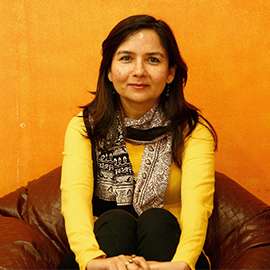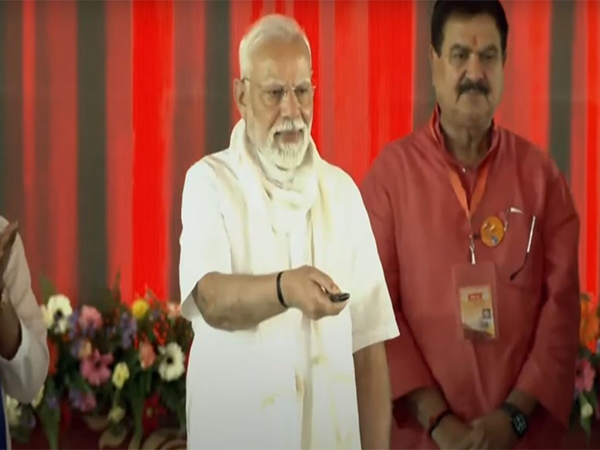Life and times of a 16th century Muslim saint who fell in love with a Hindu boy

For someone who has been teaching creative writing for over a decade, it is hardly surprising that Pakistan's Naveed Alam found the mammoth task of translating legendary saint Madho Lal Hussein's poetry "pure pleasure".
Madho Lal Hussein was a poet, weaver, mystic and saint, who created a stir in 16-century Punjab through his unconventional lifestyle and the subversive power of his poetry.
Also read - Roxane Gay's new book is important because she started writing it fat. And she still is.
In an age when few people care about prose or verse, Alam decided to translate Madho Lal Hussein's works because it should reach out to non-Punjabis. Even to Punjabis like Alam with a shaky command of their mother tongue.
Little surprise then that Alam is a believer in love too. Love as it existed in the time of Madho Lal Hussein. Of a Muslim man falling in love with a Hindu boy. Of Shah Hussein, the saint, adopting the name of his young lover and disciple - Madho Lal.
"It's possible, quite possible, some brave souls out there are humming their genuine duets in obscurity. All power to them," says Alam.
After teaching creative writing in New York for over a decade, Alam now lives in Lahore. His first collection of poems, A Queen of No Ordinary Realms won the Spokane Poetry Prize. His works have been published in several international literary journals and magazines of repute.
Alam is optimistic that his translation of the poetry of the colourful and controversial saint - "Verses of a Lowly Fakir" by Madho Lal Hussein (Penguin) - will be sold in Pakistan.
"I hope the book is available in Pakistan and helps the readers appreciate the humanity of a saint through his poetry."
Whether the "timeless verses that offer a glimpse into a world riven with political conflict and religious acrimony, churning with debate about gender and sexuality", get published in his country or not, there's no stopping the poet in him.
Alam is currently busy translating the complete kafis (rhymed compositions) of Madho Lal Hussein to be published by Penguin Classics later this year.
Edited excerpts from an interview:
Has the idea of love changed since Madho Lal Hussein's time? Is such selfless love possible in today's world?
Now here's a question that can set off a doctoral thesis. So let me put on my pedantic hat. In the age of irony Madho Lal Hussein type of love can easily be (psycho)analysed as a symptom of an emotional disorder. Too corny a concept for modern(ist) sensibility. How else would you react when love is reduced to catchy jingles in order to sell toothpaste, soaps, and diapers? Selfless love is stuff for Bollywood rather than our mundane realities.
Yet, it's possible, quite possible, some brave souls out there are humming their genuine duets in obscurity. All power to them. As for the rest of us, the ineligibles, we can take solace in the fact that no matter what time or age, from Sappho to Tarantino, the human preoccupation with desire has produced some of the most fascinating works of art and enriched our understanding, if not the practice, of love.
Also read - Yoga's so 2015: colouring books for adults are the new de-stress therapy
The bigger challenge lay in researching or translation?
Research part was work. Translation was pure pleasure.
Homosexual love is considered a sin in Islam. Legendary stories (Jamali-Kamali/Rumi-Shams etc) are debunked. Your comment, please.
I don't think one has to dig very deep to find a homophobic streak in almost any religion. Religions originate from as well as serve gender codified societies with prescribed norms of sexuality.
On the other hand, mysticism, regardless of what religious tradition it's based on, is often transgressive. It defies the rigidity of codes and structures. Therefore, it shouldn't come as a surprise if alternative sexualities find acceptance and means of expression within the mystical dimension of religions.
Whether such an expression is symbolic or literal remains open for debate. In any case, Shah Hussein is a malamati, a deliberate seeker of worldly disgrace, and his passion for a young lad from a different religion suits his philosophy of spirituality. This is how he concludes one of his kafis: "We, the sinful, are the favorites of the Master".
Why a translation of Madho Lal Hussein's verses into English?
Madho Lal Hussein's work should reach out to non-Punjabis - even to Punjabis like myself with a shaky command of their mother tongue.
To express an affinity towards a kindred sensibility, to discover and explore a poetic process and (re)examine one's own aesthetics, to recall, revive a song through the sounds of a different language while preserving its emotional vitality.
Will this book be sold in Pakistan? If yes, are you comfortable with the idea?
Madho Lal Hussein's urs (anniversary), commonly known as mela chiragh'an (festival of lamps), is celebrated in the last week of every March. Two years ago I attended a theatre play on Hussein sponsored by the local government.
The animated audience, mostly lower to lower-middle class families availing the opportunity of a free performance, booed the character of a religious scholar each time he tried to rile the Mughal authorities against Hussein's objectionable lifestyle, especially his perpetual state of inebriation and relationship with Madho, played by an attractive young actor.
"You don't have to dig very deep to find a homophobic streak in almost any religion"
Despite the prevailing trends in my country I cannot afford to lose my faith in the human spirit. Yes, I hope the book is available in Pakistan and helps the readers appreciate the humanity of a saint through his poetry.
Shouldn't you have embarked upon a more commercial project that is more profitable and has a wider reach?
You are too kind. Have I not engaged in commerce by seeking a well-reputed publisher? Consented to give this interview with an eye on publicity? Am I not promoting my translation of Hussein? Intentions are certainly not commercial, it's a literary enterprise nevertheless.
Your next book?
A wildly interpretive collection of poems based on Hussein's work.
More in Catch - City of Joy to Genius: a new book that maps the world's 'genius cities' picks Kolkata
Porn-coms are Ekta Kapoor's idea of feminism. That's a big, big problem







![BJP's Kapil Mishra recreates Shankar Mahadevan’s ‘Breathless’ song to highlight Delhi pollution [WATCH] BJP's Kapil Mishra recreates Shankar Mahadevan’s ‘Breathless’ song to highlight Delhi pollution [WATCH]](https://images.catchnews.com/upload/2022/11/03/kapil-mishra_240884_300x172.png)

![Anupam Kher shares pictures of his toned body on 67th birthday [MUST SEE] Anupam Kher shares pictures of his toned body on 67th birthday [MUST SEE]](https://images.catchnews.com/upload/2022/03/07/Anupam_kher_231145_300x172.jpg)






